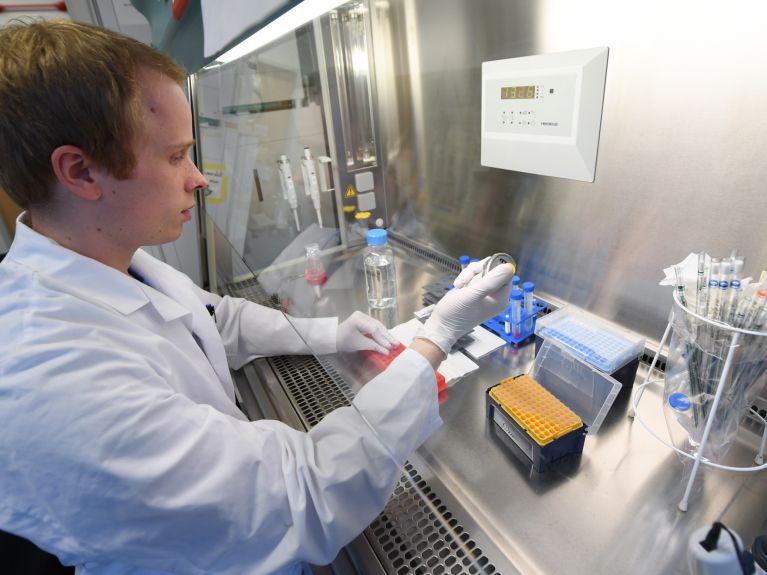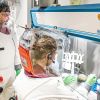Partnerships in research
Researchers worldwide are working flat out on a vaccine against the coronavirus. And German expertise is in demand.

When will there be a vaccine against Covid-19, the new respiratory disease caused by the coronavirus SARS-CoV-2? This is the question that scientists in many companies and research institutes are trying to answer. According to the World Health Organization WHO, 44 vaccine projects are underway worldwide. There are also four additional projects not yet listed by the WHO, including one run by the German Centre for Infection Research (DZIF) and another by the 'OpenCorona' consortium led by the Swedish Karolinska Institute, in which the University of Giessen is also involved. Here is an overview of the most important networks and companies with German participation:
CEPI alliance
Several countries including Australia, Canada, Germany, Japan, Canada and Norway have joined forces with the Bill & Melinda Gates Foundation and the Wellcome Trust in an international vaccine alliance called CEPI (Coalition for Epidemic Preparedness Innovations). The aim is to give a financial boost to research into vaccines to fight major epidemics or pandemics – as in the current case of Covid-19. The alliance has already been successfully involved in developing new drugs against malaria, tuberculosis and sleeping sickness.
Germany provides 13 percent of CEPI's funding. Since the beginning of the Corona crisis, it has made 140 million euros available to make rapid progress with the vaccination programme.
CureVac
The Swabian biotech company CureVac has been conducting research on a vaccine against the coronavirus since January. The company has received 8.3 million US dollars (approximately 7.5 million euros) in funding from the Coalition for Epidemic Preparedness Innovations, of which Germany is a member. The European Commission intends to support CureVac with up to 80 million euros.
CureVac could possibly have a vaccine ready within a few months. "If the results are positive, we could launch clinical trials around early summer," says co-owner and SAP founder Dietmar Hopp. Because the pressure is so enormous, the hope is that the authorities will approve funding more quickly than would usually be the case. "We might then be able to deliver the vaccine by the autumn."
The company hit the headlines in mid-March when there were reports that the USA allegedly wanted to secure exclusive rights to any vaccine against the coronavirus.

BioNTech
The Mainz-based company BioNTech is collaborating with the pharmaceutical giant Pfizer on a vaccine which it plans to test with volunteers in Europe, the USA and China starting at the end of April. To this end, the company has teamed up with a Chinese partner, Fosun Pharma in Shanghai.
If approved, Fosun Pharma would market the vaccine in China, while BioNTech would hold the marketing rights outside the People's Republic. Due to its broad development platform, the company is considered to be well positioned in the race for a coronavirus vaccine.
German Centre for Infection Research
The German Centre for Infection Research (DZIF) is also engaged in research on two different vaccines against Covid-19 with partners in Munich, Marburg and Hamburg. A modified vaccine against the MERS virus is currently being tested in clinical trials. The other is based on the virus from the measles vaccine.
Qiagen
The Dutch biotech company Qiagen has developed a molecular test for coronavirus. According to Qiagen, an existing test for 21 different pathogens of respiratory diseases has been adapted to also detect two genes of the new virus. Following clinical trials in February, the test has received CE approval and can be sold and used in Europe. Qiagen's most important production site is in Hilden, Germany.
Bosch
The Bosch company has developed a fully automated quick test that can detect or rule out a coronavirus infection within 2.5 hours. The test will already be ready for use in doctors' practices, hospitals, laboratories and health centres from April onwards on an analyser made by the Bosch subsidiary Healthcare Solutions. "The COVID 19 quick test from Bosch will help contain the spread of the pandemic and break through infection chains more quickly," said Volkmar Denner of Robert Bosch GmbH.
With material from dpa
You would like to receive regular information about Germany? Subscribe here:


